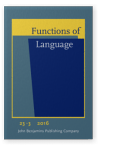Impersonal clauses in Chinese
This article deals with impersonal clauses in Chinese (ICiCs) (e.g. Táishàng chàngzhe xì, 台上唱着戏). These are called pseudo-existentials in the literature, as they resemble typical existentials both in form and in meaning. I argue that ICiCs are impersonal, ergatively oriented, and existential. They are impersonal in that the actor of the process is typically demoted to the end position or completely omitted; ergatively oriented in that they express the meaning of happening instead of doing, and existential in that they present the existence of events with reference to some location realized by the initial locative nominal group. These three semantic aspects are in tune with each other and are realized by the structure NGL ^ VG ^ NG, in which VG ^ NG constitutes the event, whose existence is expressed through its configuration with the initial NGL.
References (34)
Abraham, Werner & Elisabeth Leiss
2006 Personal and impersonal passive: Definite vs. indefinite diathesis.
Transactions of the Philological Society 104 (2). 259–296.


Afonso, Susana
2008 Existentials as impersonalizing devices: The case of European Portuguese.
Transactions of the Philological Society 106(2). 180–215.


Cáo, Bóhán
1956 Zhǔyǔ bīnyǔ wèntí suígǎn (‘Reflections on the issue of subject and object’). In Editorial Board of Chinese Language (eds.),
Hànyǔ-de Zhǔyǔ Bīnyǔ Wèntí (‘
The Issue of Subject and Object in Chinese’), 192
–198. Beijing: Zhōnghuá Shūjú.

Davidse, Kristin
1992 Transitivity/Ergativity: The Janus-headed grammar of actions and events. In
Martin Davies &
Louise Ravelli (eds.),
Advances in systemic linguistics: Recent theory and practice, 105–135. London: Pinter.

Davidse, Kristin
1998 On transitivity and ergativity in English, or on the need for dialogue between schools. In
Johan van der Auwera,
Frank Durieux, &
Ludo Lejeune (eds.),
English as a human language: To honour Louis Goossens, 3–26. Munich: Lincom Europa.

Dixon, R.M.W
1994 Ergativity. Cambridge: CUP.


Fan, Fanglian
1963 Cúnzàijù (‘Existential sentences’).
Zhōngguó Yǔwén (‘
Chinese Language’) 51. 386–393.

Fù, Zǐdōng
1956 Zhǔcí hé bīncí (‘Subject and object’). In Editorial Board of
Chinese Language (eds.),
Hànyǔ-de Zhǔyǔ Bīnyǔ Wèntí (‘
The Issue of Subject and Object in Chinese’), 76
–96. Beijing: Zhōnghuá Shūjú.

Guo, Jimao
1990 Lǐngzhǔshǔbīnjù (‘Sentences with possessor as subject and possessum as object’).
Zhōngguó Yǔwén (‘
Chinese Language’) 11. 24–29.

Halliday, M.A.K
1968 Notes on transitivity and theme in English: Part 3.
Journal of Linguistics 41. 179–215.


Halliday, M.A.K
1994 An introduction to Functional Grammar, 2nd edn. London: Arnold.

Halliday, M.A.K. & James R. Martin
1993 Writing science. London: The Falmer Press.

Halliday, M.A.K. & Christian M.I.M. Matthiessen
1999 Construing experience through meaning: A language-based approach to cognition. London: Cassell.

Halliday, M.A.K. & Christian M.I.M. Matthiessen
2004 An introduction to Functional Grammar, 3rd edn. London: Arnold.

Langacker, Ronald W
1991 Foundations of Cognitive Grammar, Vol.2: Descriptive application. Stanford, CA: Stanford University Press.

Malchukov, Andrej & Akio Ogawa
Pan, Haihua & Jingquan Han
2005 Xiǎnxìng fēibīngé dòngcí jiégòude jùfǎ yánjiū (‘The Syntax of Surface Unaccusative Constructions’).
Yǔyán Yánjiū (‘
Language Research’) 31. 1–13.

Ren, Ying
2009 Cóng gàiniànde guānlián dào gòushì-de guānlián: Yě cóng Wáng Miǎn sǐle fùqīnde shēngchéng fāngshì shuōqǐ (‘How the sentence ‘Wáng Miǎn sǐ-le fùqīn’ is generated: From the correlation of concepts to that of constructions’).
Shìjiè Hànyǔ Jiāoxué
(‘
Chinese Teaching in the World’) 31. 308–321.
Shi, Yuzhi
2007 Yǔyánxué jiǎshèzhōngde zhèngjù wèntí (‘On evidence of linguistic hypothesis’).
Yǔyán Kēxué (‘
Linguistic Sciences’) 41. 39–51.

Siewierska, Anna
2008 Introduction: Impersonalization from a subject-centred vs. agent-centred perspective.
Transactions of the Philological Society 106(2). 115–137.


Song, Yuzhu
2007 Xiàndài Hànyǔ Cúnzàijù (
‘Existential sentences in Modern Chinese’): Beijing: Yuwen Chubanshe.

Wang, Yong & Jie Xue
2010 Hànyǔ cúnzàijùde gòushì yǔfǎ yánjiū (‘A Construction Grammar study of the Chinese existential sentence’).
Yǔyán Yánjiū (‘
Language Research’) 31. 62–70.

Wang, Yong & Yingfang Zhou
2011 Cúnzàijù zhǔyǔ de lèixíngxué yánjiū (‘A typological study of the subject in the existential construction’).
Wàiyǔ Jiàoxué yǔ Yánjiū (‘
Foreign Language Teaching and Research’) 21. 163–182.

Wang, Yong & Yingfang Zhou
2014a Xiàndài hànyǔ zhōngde shìjiànlèi cúnzàijù (‘Event-existentials in Modern Chinese’).
Wàiguóyǔ ( ‘
Journal of Foreign Languages’) 31. 71–82.

Wang, Yong & Yingfang Zhou
2014b A functional study of event-existentials in Modern Chinese.
Functional Linguistics 11:7.


Xu, Jie
1999 Liǎngzhǒng bǎoliú bīnyǔ jùshì jí xiāngguān jùfǎ lǐlùn wèntí (‘Some theoretical issues of the two types of Chinese retained-object construction’).
Dāngdài Yǔyánxué (‘
Contemporary Linguistics’) 11. 16–29.

Xing, Fuyi
1996 Hànyǔ Yǔfǎxué (‘
Chinese Grammar’). Changchun: North-East Normal University Press.

Yi, Yan & Anna Siewierska
Zhu, Dexi
1980 Xiàndài Hànyǔ Yǔfǎ Yánjiū (‘
Studies on the Grammar of Modern Chinese’). Beijing: Commercial Press.

Zhu, Dexi
1981 Yǔfǎ Jiǎngyì. (‘
Lecture Notes on Chinese Grammar’). Beijing: Commercial Press.

Zhu, Dexi
1985 Yǔfǎ Dáwèn (‘
Dialogues on Chinese Grammar’). Beijing: Commercial Press.

Ziv, Yael
1982 Getting more mileage out of existentials in English.
Linguistics 201. 747–762.

Cited by (2)
Cited by 2 other publications
Xiang, Dajun
2024.
The construction of “Wangmian Si-le Fuqin” in Mandarin Chinese: A Cardiff Grammar approach.
Language Sciences 104
► pp. 101643 ff.

Wang, Yong
2021.
Entity- vs. event-existentials: A new typology.
Australian Journal of Linguistics 41:2
► pp. 195 ff.

This list is based on CrossRef data as of 2 july 2024. Please note that it may not be complete. Sources presented here have been supplied by the respective publishers.
Any errors therein should be reported to them.
